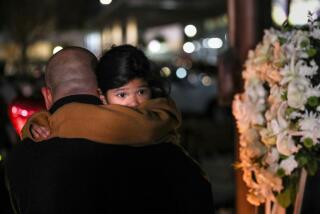Abuse Allegations Stir Parents’ Fears
Thirty years ago, Margaret Wennberg of Hollywood used to warn her children not to talk to strangers.
But her daughter, who now has four children of her own, is much more specific in her admonitions.
“I say, like, ‘If anybody ever touches you, tell Mommy and Daddy, those are your privates,’ ” says Kathie Flores, who is rearing two sets of twins, 2 and 5, in Sun Valley. “I think about this abuse stuff more and more. The more I hear about it, the more I worry.”
Flores is not alone. In a climate in which everyone from priests to nannies to entertainers has been accused of sexual misconduct, parents are scared. But while that fear can generate the kind of healthy concern that can prevent abuse, child-care professionals say, it can also be misdirected.
“I see it as realistic awareness of problems that have been denied and repressed for too long and that it’s good to be aware of those problems and to try and prevent them,” says Stuart Oskamp, a professor of social psychology at Claremont Graduate School. “But certainly not every allegation is necessarily true, so you can’t just immediately assume that any allegation represents a real problem. You have to look at each case separately.”
Parents say the swirl of publicity surrounding the accusations against Michael Jackson has forced them to once again think about the safety of their children. (No charges have been filed against the pop superstar, who has denied allegations that he molested a 13-year-old boy. His representatives say the allegations grew out of a failed extortion attempt.)
Ann Pleshette Murphy, the editor in chief of Parents Magazine, says reader surveys show that parents are worried about their children being kidnaped or abused.
Parents responding to a March health and safety quiz were overwhelmingly concerned most about their children becoming crime victims, Murphy says, although the majority of the parents who read her magazine have children younger than 6.
“Anything a parent feels she has no control over--like crime or, in the extreme, sexual abuse--is shocking because you say, ‘There but for the grace of God go I,’ ” Murphy says. “The things that are most dreaded are the things we can do nothing about.
“That’s why you hear a parent say they are worried about a child being kidnaped when in reality, their chances of being kidnaped are about as great as being hit by lightning.”
According to the National Committee for the Prevention of Child Abuse, there were 404,000 reported cases of child sexual abuse in 1991, an increase of 6% over the previous year.
But media attention, especially on the less-frequent cases of children who are molested by strangers, makes the problem seem much worse, says Deanne Tilton Durfee, the executive director of the Los Angeles County Inter-Agency Council on Child Abuse and Neglect.
In reality, Durfee says, the majority of children who are molested are attacked by relatives or other people they know well and trust.
Flashy news stories also run the risk of creating a backlash among those people who think that child molestation charges are spurious, these experts say.
“The general public is divided between those who believe there is an overreaction and that people are being unfairly accused and those who believe there has been an under-reaction and that we need to be more pro-active in prosecuting suspected child abusers,” Durfee says. “The reality is that there is a balance in there somewhere. Most children are safe and will not be molested if they live in a healthy, nurturing environment.”
But that doesn’t make a lot of parents feel better.
“I think that one of the problems is that we all want absolute answers, we want to know where danger is and danger isn’t and we want it to be absolute,” Durfee says. “This is not an exact science.”
Flores says she will not leave her twins with anyone but her mother. The younger ones, she fears, are still too young to tell her how they are treated by others.
Another mother says she will not allow her father-in-law to pick them up from school--just in case. “You hear so many things,” she explains.
Anita Iverson, a professor of child and family psychology at Catholic University in Washington, D.C., says it is appropriate for parents to consider issues of sexual abuse when making child-care decisions.
“Some parents probably feel more fear than they need to, some parents may be overwhelmed by the fear in a way that’s not helpful, but it is hard to say whether it is in or out of proportion to the actual problem,” Iverson says. “For any individual parent, one incident is too much.”
More to Read
Sign up for Essential California
The most important California stories and recommendations in your inbox every morning.
You may occasionally receive promotional content from the Los Angeles Times.










